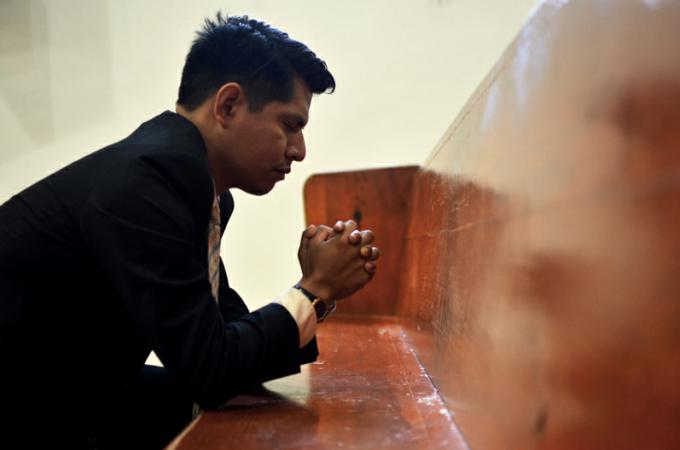
Faith
All of us should be careful not to claim more fidelity and devotion than we possess. We are all sinners. Some of us are repentant sinners. Others are not.

Wolfe
I love the fact that leaving the Church is well-nigh impossible. Once you've been baptized, you're a member of the Catholic Church, and there aren't many ways to get out. Of course, you can fall into heresy and error, commit terrible sins, and repudiate your own membership. But those things just make you bad Catholic; they don't remove you from the Church. I've known a number of "ex-Catholics" who believe they aren't Catholic anymore. But canonically, that's highly unlikely to be true. You might not think of yourself as a Catholic, but the Church considers you a non-practicing one. You may even think of yourself as an atheist, or a member of an entirely different religion. But a person's valid baptism will probably be recognized by the Church forever.
There's something very beautiful about that. We know there is nothing we can do to earn salvation. But it's nice to know that the Church does not abandon us, even when we choose to abandon her. Our connection to the Church is not fragile, but strong. We don't sever that connection -- or any part of it -- easily. And that's for good reason: souls are worth fighting for.
Most of us have found difficulty with one aspect of Church teaching or another. The Gospel is challenging and, but for the grace of God, every one of us could find ourselves in heresy, schism, and heterodoxy. The history of the Church shows that more than a few bishops and patriarchs have. The real issue isn't whether we assent to everything without a struggle, but whether we are humble enough to be taught. We grow in faith over time, but only when we accept the Church's magisterial authority as divinely instituted. And that's where "obstinacy" comes into play. Whatever our political views, none of us should celebrate the imposition of ecclesial discipline on any member of the Church or respond to news of it with triumphalism of any kind.
Nor should any of us attempt to judge the propriety of a bishop's pastoral care over those in his diocese. Why? Because again, souls are worth fighting for. How we fight for them is largely decided by an ordinary, that is, by the bishop who is appointed shepherd of a particular local Church. The Church can educate, exhort, enjoin. She can also exclude and excommunicate if she has reason to believe those tools may ultimately motivate someone to repent. In other eras, these actions accomplished that.
All of us should be careful not to claim more fidelity and devotion than we possess. We are all sinners. Some of us are repentant sinners. Others are not. Individual Catholics do not have the right to define what constitutes a Catholic in good standing; only bishops do. We should know that when we dissent from Church teaching, we do so to the detriment of Church unity and at the risk of our own souls. A devout Catholic is formed by what the Church teaches, not just informed by it. And "good standing" was never the goal -- sanctity is.
A saint is one whose love is like God's. St. Paul tells us that kind of love is neither arrogant nor rude; it does not insist on its own way; it does not rejoice in wrongdoing, but in the truth. In charity, we must learn to bear all things, believe all things, hope all things, and endure all things. At the top of that list of "things" are those who are, with us, the Church, the Body and Bride of Christ.
Our times call for both humility and courage. Bishops who are proud or cowardly do not serve the Church well. Neither do those of us who claim to be devout Catholics but choose to embrace only those teachings with which serve our own agendas. Nobody should be dancing in the streets or raising a stink. All of us should spend more time on our knees, praying for those we see as adversaries as well as those we see as allies.
- Jaymie Stuart Wolfe is a Catholic convert, wife, and mother of eight. Inspired by the spirituality of St. Francis de Sales, she is an author, speaker, and musician, and provides freelance editorial services to numerous publishers and authors as the principal of One More Basket. Find Jaymie on Facebook or follow her on Twitter @YouFeedThem.
Recent articles in the Faith & Family section
-
What is the church's position on the treatment of animals?Jenna Marie Cooper
-
Popular devotions and the liturgyFather Robert M. O’Grady
-
The Fight for Our FaithMaureen Crowley Heil
-
The shepherd's voiceScott Hahn
-
Scripture Reflection for April 21, 2024, Fourth Sunday of EasterJem Sullivan


















